
Sambandar, also referred to as Tirujnana Sambandar, was a Shaiva poet-saint of Tamil Nadu who lived sometime in the 7th century CE. According to the Tamil Shaiva tradition, he composed an oeuvre of 16,000 hymns in complex meters, of which 383 (384) hymns with 4,181 stanzas have survived. These narrate an intense loving devotion (bhakti) to the Hindu god Shiva. Sambandar died when he was sixteen years of age. The surviving compositions of the poet-saint are preserved in the first three volumes of the Tirumurai, and provide a part of the philosophical foundation of Shaiva Siddhanta.
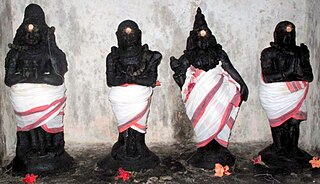
Tirumurai is a twelve-volume compendium of songs or hymns in praise of Shiva in the Tamil language from the 6th to the 11th century CE by various poets in Tamil Nadu. Nambiyandar Nambi compiled the first seven volumes by Appar, Sambandar, and Sundarar as Tevaram during the 12th century. During the course of time, a strong necessity was felt by scholars to compile Shaiva literature to accommodate other works. Tiruvasakam and Tirukovayar by Manickavasagar are included as the eighth, nine parts are compiled as the ninth Tirumurai out of which most are unknown, and the tenth as Tirumandiram by Tirumular, the famous Siddhar. The eleventh is compiled by Karaikal Ammaiyar, Cheraman Perumal and others. The contemporary Chola king was impressed by the work of Nambi and included Nambi's work in the eleventh Tirumurai. Sekkilar's Periya Puranam, composed a century later, contains the life depiction of all the 63 Nayanmars. The response for the work was so tremendous among Shaiva scholars and Kulothunga Chola II that it was included as the 12th Tirumurai. Tirumurai along with Vedas and Shaiva agamas form the basis of Shaiva Siddantha philosophy in South India and Sri Lanka.

The Nayanars were a group of 63 Tamil Hindu saints living during the 6th to 8th centuries CE who were devoted to the Hindu god Shiva. Along with the Alvars, their contemporaries who were devoted to Vishnu, they influenced the Bhakti movement in early medieval South India. The names of the Nayanars were first compiled by Sundarar. The list was expanded by Nambiyandar Nambi during his compilation of material by the poets for the Tirumurai collection, and would include Sundarar himself and Sundarar's parents.
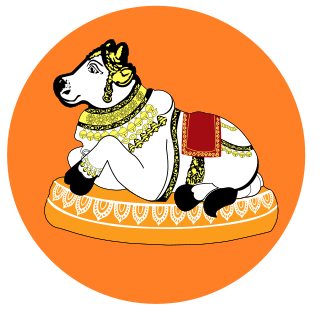
Thiruvasagam is a volume of Tamil hymns composed by the ninth century Shaivite bhakti poet Manikkavasagar. It contains 51 compositions and constitutes the eighth volume of the Tirumurai, the sacred anthology of the Tamil Shaiva Siddhanta.

The Periya Purāṇam, that is, the great purana or epic, sometimes called Tiruttontarpuranam, is a Tamil poetic account depicting the lives of the sixty-three Nayanars, the canonical poets of Tamil Shaivism. It was compiled during the 12th century by Sekkilar. The Periya Puranam is part of the corpus of Shaiva canonical works.
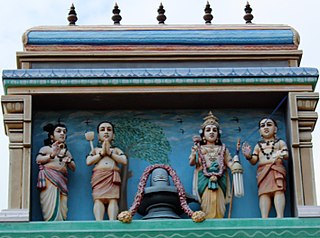
Sundarar, also referred to as Chuntarar, Chuntaramurtti, Nampi Aruran or Tampiran Tolan, was an eighth-century poet-saint of Tamil Shaiva Siddhanta tradition of Hinduism. He is among the Tevaram trio, and one of the most prominent Nayanars, the Shaiva bhakti (devotional) poets of Tamil Nadu.

Nandanar, also known as Thirunaallaippovaar and Tirunallaipovar Nayanar, was a Nayanar saint, who is venerated in the Hindu sect of Shaivism. He is the only Paraiyar saint in the Nayanars. He is generally counted as the eighteenth in the list of 63 Nayanars. Like the other Nayanars, he was a devout devotee of the god Shiva.

The Tevaram, also spelled Thevaram, denotes the first seven volumes of the twelve-volume collection Tirumurai, a Shaiva narrative of epic and Puranic heroes, as well as a hagiographic account of early Shaiva saints set in devotional poetry. The Tevaram volumes contain the works of the three most prominent Shaiva Tamil saints of the 7th and 8th centuries: Sambandar, Appar, and Sundarar. The three saints were not only involved in portraying their personal devotion to Shiva, but also engaged a community of believers through their songs. Their work is an important source for understanding the Shaiva Bhakti movement in the early medieval South India.
Thirunaraiyur Nambiyandar Nambi was an eleventh-century Shaiva scholar of Tamil Nadu in South India who compiled the hymns of Sambandar, Appar and Sundarar and was himself one of the authors of the eleventh volume of the canon of the Tamil liturgical poetry of Shiva, the Tirumurai.
Pusalar is an eighth-century Nayanar saint, venerated in the Hindu sect of Shaivism. He is generally counted as the fifty-eighth in the list of 63 Nayanars. His hagiography speaks how he created a grand temple for Shiva in his mind and how his patron god Shiva preferred attending the consecration of his mind temple, instead of a grand temple created by a Pallava king.
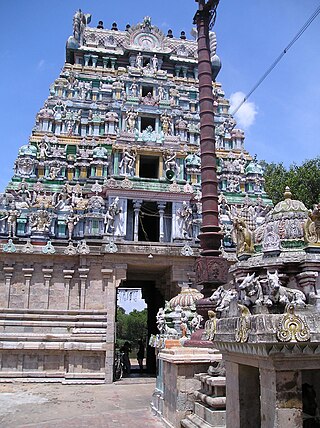
Kalyanasundaresar Temple, Nallur or Thirunallur is a Hindu temple dedicated to the deity Shiva in Nallur, Tamil Nadu, India. It is located 10 km (6.2 mi) away from Kumbakonam, 6 km (3.7 mi) east of Thirukkarugavur, and 30 km (19 mi) south of Thanjavur.
Hinduism in Tamil Nadu finds its earliest literary mention in the Sangam literature dated to the 5th century BCE. The total number of Tamil Hindus as per 2011 Indian census is 63,188,168 which forms 87.58% of the total population of Tamil Nadu. Hinduism is the largest religion in Tamil Nadu.
Rudra Pasupathi Nayanar is the 16th Nayanar saint. Traditional hagiographies like Periya Puranam and Thiruthondar Thogai detail his legendary life and services to the Hindu god Shiva. Pasupathi Nayanar was a learned Brahmin devotee who practised chanting of the Shri Rudram Chamakam, a Vedic hymn dedicated to Rudra. Therefore, he is known by the name Rudra Pasupathi Nayanar.

Narasinga Muniyaraiyar Nayanar is the 40th Nayanar saint. Traditional hagiographies like Periya Puranam and Thiruthondar Thogai detail his legendary life and services to the Hindu god Shiva.Narasinga Muniyaraiyar Nayanar was the chieftain of the state Tiru Munaipadi.Muniyaraiyar The saint was a contemporary of Sundarar.
Tiru Kurippu Thonda Nayanar or Thiru Kurippu Thonda Nayanar is one of the Nayanars, 63 devotees to the Hindu god Shiva who are revered as saints in Shaivism. His life is recorded in traditional hagiographies like Periya Puranam, Tirutoṇṭar Antādi and Thiruthondar Thogai. The saint was serving the Shiva devotees by reading their facial expressions and understanding their actual needs. This service earned him the name Tiru Kurippu Thonda Nayanar: Thiru is an honorific term in Tamil; Kurippu means "expressions" in general, and "facial expressions" in particular; and Thondar means "voluntary servant".
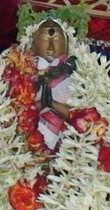
Apputhi Adigal, also spelt as Apputhi Adikal, Atputhi Adigal, Apputi Adigal, Appoodi Adikal, Appoothi Adikal and Appudhi Adigal and known as Appuddi Nayanar, was a Nayanar saint, venerated in the Hindu sect of Shaivism. He is generally counted as the twenty-fifth in the list of 63 Nayanars. He is described as a contemporary of Appar or Thirunavukkarasar, one of the most prominent Nayanars.
Kungiliya Kalaya Nayanar, also known as Kungiliya Kalaya, Kalayar, Kunguliya and Kalaya Nayanar, is a Nayanar saint, venerated in the Hindu sect of Shaivism. He is generally counted as the eleventh in the list of 63 Nayanars.

Tiru Nilakanta Yazhpanar was a Nayanar saint, venerated in the Hindu sect of Shaivism. He is generally counted as the sixty-first in the list of 63 Nayanars. While the first part of his name can be spelt as Tirunilakanta, Tirunilakantha, Tiru Neelakanta, Tiru Nilakanta, Nilakantan and Thiruneelakanda, Yazhpanar is spelt as variously as Yalppanar, Yalapannar, Yalpanar and Yazhpaanar. He is described as a companion of Sambandar, one of the most prominent Nayanars.
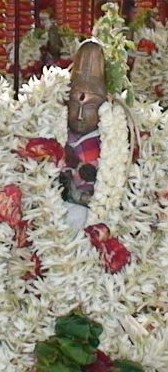
Tirunilanakka Nayanar, also known Tiruneelanakka, Nilanakkar and Nilanakkan, was a Nayanar saint, venerated in the Hindu sect of Shaivism. He is generally counted as the twenty-eighth in the list of 63 Nayanars. He is described as a contemporary of Sambandar, one of the most prominent Nayanars.








